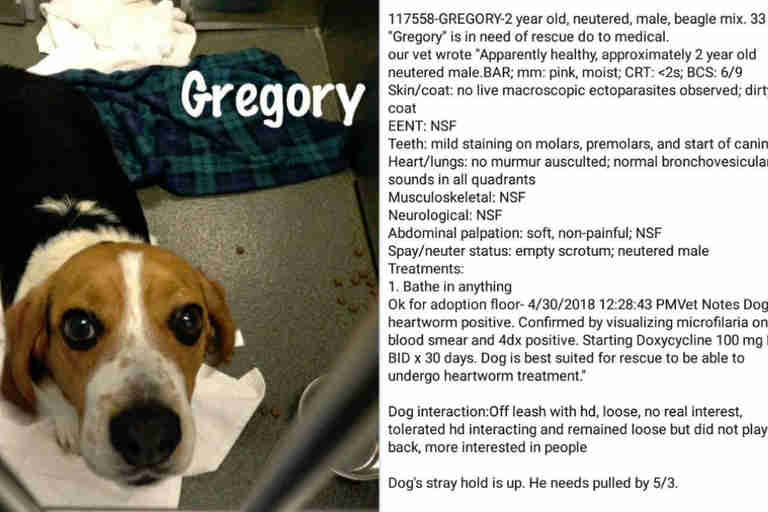
Posted on 05/13/2018 10:18:38 AM PDT by ColdOne
Gregory the beagle has become a local celebrity after a photo of the hound on his “freedom ride" went viral, his rescuer says.
Gregory was recently taken to the Franklin County Shelter and Adoption Center after he found running astray. While the hound was in relativity good health, his heartworm test came back positive and was subsequently placed on the shelter’s euthanasia list.
“I saw the shelter’s post and my husband immediately drove there to pick him up,” Schenley Hutson Kirk, co-founder of Hound Rescue and Sanctuary, told Fox News on Friday.
On the two-hour drive back to Findley, Gregory couldn’t contain his excitement. While new rescues are typically transported in a crate during the drive back to the sanctuary, she said, Kirk’s husband, Joe, let the pup ride safely tethered to the backseat.
“He [Gregory] was so overwhelmed and excited, he was licking Joe and being so affectionate,” Kirk said.
At a stop light, Joe decided to snap a picture of the pup on his “freedom ride.” At that same moment, Gregory snuggled up to Joe, tenderly looking up to his rescuer.
(Excerpt) Read more at foxnews.com ...
To think some people treat them like trash. Those people don’t deserve to live.
How kind of them. Get well soon, Gregory!

Lucky dog, to be discovered by a family ready to assume the costs of treating him.
One question: Are Heartworms contagious to other dogs?
I would be very concerned about bringing such an animal home to meet my present dogs.
Love it. My coonhound and cattle dogs are both from rescues. They seem to know how lucky they are
Best dog we ever had was a 3 year old boxer we adopted from a local shelter. She seemed to know that we saved her and was forever grateful. She became known in the family as ‘the best dog ever’.
Your other dogs should already be taking heartworm prevention medication, or you could lose them to it.
Live life like a rescue dog!
Per Wiki
Heartworm or dog heartworm, is a parasitic roundworm that is spread from host to host through the bites of mosquitoes. The heartworm is a type of filarial worm, a small thread-like worm, that causes filariasis. The definitive host is the dog, but it can also infect cats, wolves, coyotes, jackals, foxes, and other animals, such as ferrets, bears, sea lions and even, under very rare circumstances, humans.[1]
The parasite is commonly called “heartworm”; however, adults often reside in the pulmonary arterial system (lung arteries), as well as the heart, and a major effect on the health for the animal is a manifestation of damage to the lung vessels and tissues.[2] Occasionally, adult heartworms migrate to the right heart and even the great veins in heavy infections. Heartworm infection may result in serious disease for the host, with death typically as the result of congestive heart failure.
Treatment
If an animal is diagnosed with heartworms, treatment may be indicated. Before the worms can be treated, however, the dog must be evaluated for heart, liver, and kidney function to evaluate the risks of treatment. Usually, the adult worms are killed with an arsenic-based compound. The currently approved drug in the US, melarsomine, is marketed under the brand name Immiticide.[18] It has a greater efficacy and fewer side effects than previously used drug (thiacetarsamide, sold as Caparsolate), which makes it a safer alternative for dogs with late-stage infections.
After treatment, the dog must rest (restricted exercise) for several weeks so as to give its body sufficient time to absorb the dead worms without ill effect. Otherwise, when the dog is under exertion, dead worms may break loose and travel to the lungs, potentially causing respiratory failure and death. According to the American Heartworm Society, use of aspirin in dogs infected with heartworms is no longer recommended due to a lack of evidence of clinical benefit and may be contraindicated. It had previously been recommended for its effects on platelet adhesion and reduction of vascular damage caused by the heartworms.
The course of treatment is not completed until several weeks later, when the microfilariae are dealt with in a separate course of treatment. Once heartworm tests are negative, the treatment is considered a success.
Surgical removal of the adult heartworms as a treatment also may be indicated, especially in advanced cases with substantial heart involvement.[19]
Long-term monthly administration of ivermectin year-round at three times the dose normally used for heartworm prevention eventually kills adult heartworms. However, this is not the treatment of choice for removal of adult heartworms for two reasons. First, this treatment is not as effective as melarsomine. More importantly, adult heartworms do not begin to die until 18 months of treatment have elapsed, which is not acceptable for dogs with high-volume infections.
Long-term treatment over a year with doxycycline daily and Heartgard Plus has been shown to be effective in early heartworm patients which are asymptomatic.
What a cutie.
My buddy Mr Pookie was a pound recue Black Lab.
Heartworm probably took a few years off him.
East Tx, Arkansas is ground zero for it.
I had no idea.
I got 12 years out of him despite the HW
Poor old Pook.
When I named him, I told the boy, “you cant name a Lab Spike or Bone crusher, His name is Pookie, but we’ll add the Mr so he has some dignity” :)
Nuheart is the brand I order. It does not require a prescription from the vet...no vet office visit charge for the prescription either.
BTW, to see my doggies, click on my name.
LOL...love the doggies. My dog is at my home page here.
I see no picture.


Disclaimer: Opinions posted on Free Republic are those of the individual posters and do not necessarily represent the opinion of Free Republic or its management. All materials posted herein are protected by copyright law and the exemption for fair use of copyrighted works.